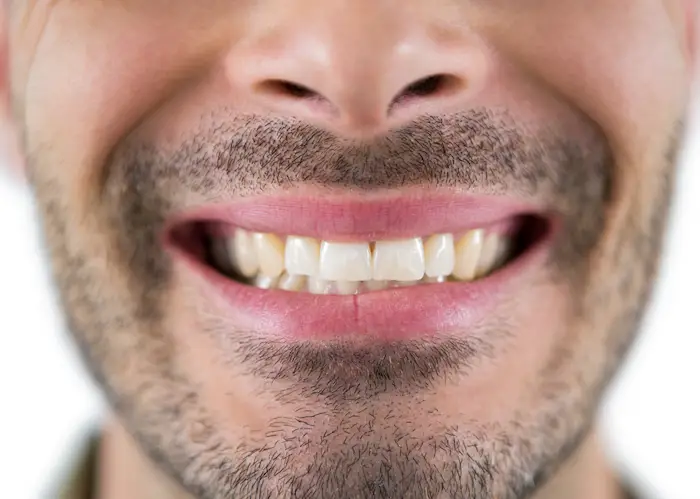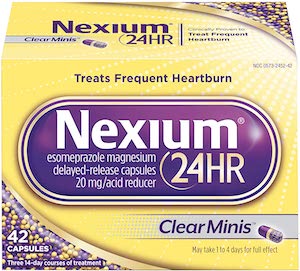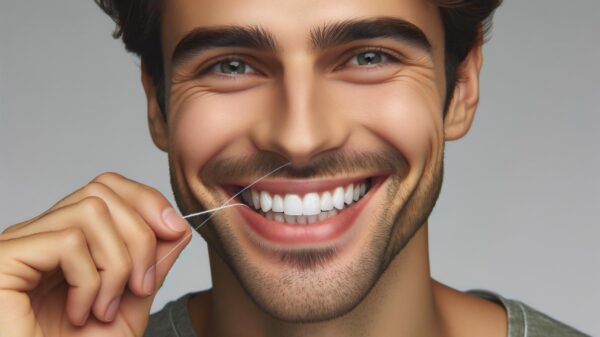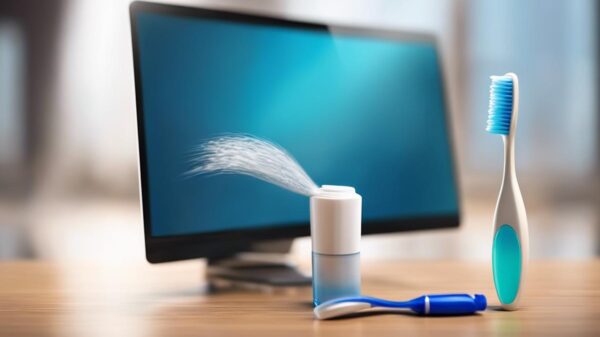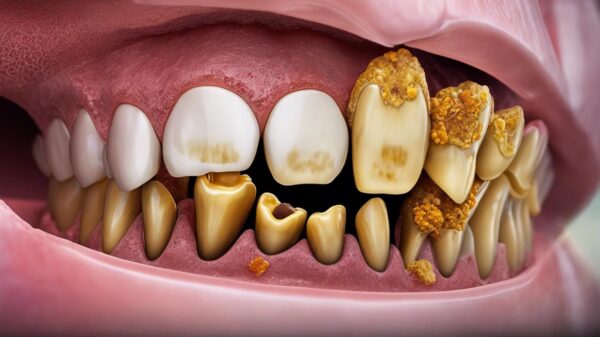Common Causes of Tooth Erosion
What you eat and drink has a greater impact on your oral health than you realize. Many people think that only sugary foods are harmful to teeth, but the truth is that acidic foods also cause a lot of damage. Understanding the main causes of tooth erosion can help you be more proactive in protecting your teeth, and can help you catch the problem before it progresses too far.
What are the main causes of tooth erosion? Poor oral health, too much sugar and acid in foods, teeth grinding, acid reflux, certain medications, and eating disorders are the most common causes of tooth erosion.
The hard surface of your tooth is made up of a substance called enamel that protects them from physical and chemical damage. Enamel cannot be regrown – once it is damaged, it is permanent. Practicing good oral health and balancing your diet can help the enamel hold strong against normal wear and tear.
Symptoms of Tooth Erosion
Before we dig into the causes of tooth erosion, it’s important to know what symptoms you may experience so that you can recognize them and get them taken care of quickly. Depending on the severity of the tooth erosion, you may have different levels of sensitivity and pain.
The most common symptoms include increased sensitivity to temperature, cracks or chips in your teeth, and discoloration. If there is significant erosion, your pain may be much worse and, over time the erosion can lead to yellow, stained teeth, overly sensitive teeth, tooth decay, and shiny spots on your teeth.
Your teeth will undergo normal wear and tear, which will include some slight enamel erosion; however, when the erosion causes pain and sensitivity – it is time to visit a dentist.
Poor Oral Health Practices
One of the best ways for you to prevent extreme enamel erosion is to simply take care of your teeth. Brushing them twice a day, for approximately 2 minutes each, regular flossing, and a dental visit every 6 months will ensure the proactive protection of your teeth.
Keeping teeth healthy takes a lifetime of care. Even if you’ve been told you have nice teeth, but neglect to brush your teeth at night, bacteria and plaque can build up and create problems that are deeper than the surface.
When you brush improperly, neglect to floss your teeth, and fail to visit your dentist every six months, problems will build up – whether they are visible or not. It may be surprising, but many people don’t realize they are brushing wrong, or their fear of the dentist keeps them from going in when something hurts.
Don’t fall into this category. Learn how to take care of your oral health and don’t hesitate to see your dentist if you have pain or sensitivity.
High Sugar and Acidic Diet
 Growing up, you were most likely told you can’t eat a lot of candy because it will make your teeth rot. While this is technically true, highly acidic foods can also cause major enamel erosion.
Growing up, you were most likely told you can’t eat a lot of candy because it will make your teeth rot. While this is technically true, highly acidic foods can also cause major enamel erosion.
Foods like ice cream, syrups, caramel, citrus fruits, berries, sodas, energy drinks, and juices will all wear down your enamel if you eat them too often.
Sodas and other carbonated drinks are a major culprit of tooth erosion because the “fizz” raises the acid level.
Saliva is constantly neutralizing the acid in your mouth to protect your teeth, but with large quantities of sugary and acidic foods, it is not always effective. Everything in moderation – make that your motto when you crave your next soda or ice cream fix.
Teeth Grinding
Teeth grinding most often occurs when an individual is asleep – and they often won’t know they do it unless someone tells them or they wake up with a sore jaw. Sometimes, people will also grind their teeth by clenching a jaw. This act can put excessive pressure on your teeth and cause wear and tear to occur more rapidly.
Stress and anxiety are the most common causes behind teeth grinding, and the scary thing is, they can be much more damaging to your teeth than you realize. When sleeping, your brain cannot control how much pressure you exert on your teeth and cause you to clench with much more force than if you were awake. Over time, this can cause the enamel to wear down and you can even experience cracks in your teeth.
To stop grinding your teeth at night, your dentist may recommend a mouthguard that acts as a cushion and protects your enamel while you sleep. Also, reducing your stress may limit the amount of grinding that occurs – though sometimes that’s easier said than done.
Acid Reflux
Our stomachs produce strong acids that help us digest our food. When an individual has a medical condition called “acid reflux” this acid can make its way up the esophagus and into the mouths – both during the day and when we sleep.
This constant influx of acid can be too much for our saliva to handle and can allow the harmful acid to erode our enamel. Saliva acts as a neutralizer to acid and helps wash away food particles and bacteria; when there is too much acid or not enough saliva, the acid remains and eats away at the enamel.
Teeth Eroding Medications
Medications are supposed to help us – so how can they be a contributing cause to teeth erosion? Antihistamines, aspirins, decongestants, beta-blockers, antidepressants, and more can all have a side effect that causes dry mouth, which limits your saliva levels.
We’ve discovered how important saliva is to the process of neutralizing harmful acids, washing away bacteria, and helping to remineralize the enamel. When dry mouth occurs and saliva is low, your teeth are more vulnerable to tooth erosion.
Unfortunately, some medications may be necessary for us to take daily. So, if you are experiencing dry mouth and start to have sensitivity or oral pain – talk to your dental professional at Dental Associates of Madison about what you can do to protect your teeth.
Eating Disorders – Bulimia
Bulimia is an eating disorder where an individual will force themselves to vomit after eating. When we vomit, our mouth is exposed to strong, harmful stomach acid that eats away at the enamel on the inside of your teeth.
Continual exposure to the stomach acid will cause the tooth erosion to accelerate rapidly, leaving you with dental pain and sensitivity, and often the need for more advanced dental treatments.
Apart from the dental problems associated with the eating disorder Bulimia are several other health problems that can stay with you for a long, long time. If you are feeling the need to lose weight or are battling with something mentally – talk to someone about it. Taking care of your physical health often begins with taking care of your mental health.
Treating and Preventing Tooth Erosion
You only have one tooth enamel in your life and it doesn’t grow back. So how do you take care of it and treat it? First of all, talk to your dentist about treatment options that work best for you. They will likely do tooth bonding, add a dental veneer/crown, or in really bad cases, remove the eroded teeth.
- Tooth bonding: a resin that is tooth-colored material is applied to the surface of a stained or damaged tooth; the resin will cover any discoloration and protect your tooth from further dental erosion.
- Dental veneers/crowns: thin shells that are fitted precisely to the size and shape of your tooth adhere to the front side of your teeth; in this way, they can act as a protectant shield between the dentin (inner part of the tooth) and the outer elements.
- Tooth removal: in some cases when erosion has progressed through the dentin, removal is the best, and only, option; after the removal, you and your dentist can decide on dentures, dental implants, dental bridges, or other procedures for both appearance and to protect the rest of your teeth.
Tips and Tricks to Protect Your Teeth
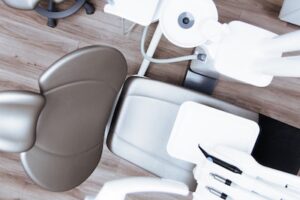 Having healthy teeth begins with having good oral practices – brushing, flossing, and visiting the dentist. Beyond that, here are a few tips and tricks to help protect your teeth from enamel erosion.
Having healthy teeth begins with having good oral practices – brushing, flossing, and visiting the dentist. Beyond that, here are a few tips and tricks to help protect your teeth from enamel erosion.
- Limit and avoid certain sugary and acidic foods – using a straw when drinking soda can help limit the acid that remains in your mouth
- Chew sugar-free gum to help produce and move saliva around in your mouth
- Finish eating meals by rinsing your mouth with water or milk – this can help wash away and neutralize acids
- Use toothpaste or mouthwash with fluoride to help reduce your risk of decay
- Minimize your intake of alcohol and tobacco products
- Talk with your doctor and dentist to determine if any medications are impacting your oral health and come up with a plan to ensure you are protected



